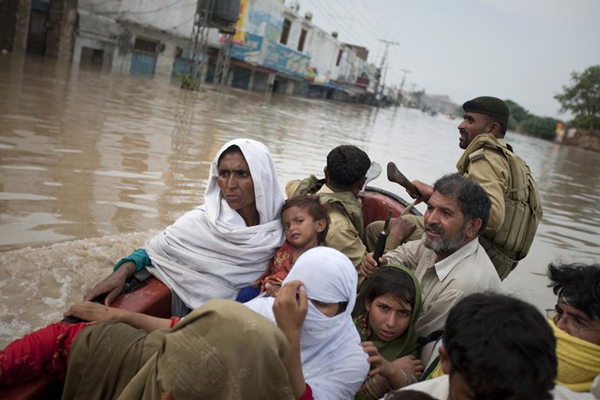With the increasing amount of climate catastrophes occurring around the world daily, it is easy to wonder how global climate change impacts property law. In Pakistan, cataclysmic flooding, triggered by unprecedented monsoon rainfall and glacial melting, has killed over 1,000 people.[1] The monsoon continued destroying hundreds of thousands of homes and millions of acres of crops, affecting more than 30 million people, and causing billions of dollars in damage.[2] As a result, Pakistani property that was subjected to extreme flooding has become less valuable for irrigation farming or dry land farming.[3]
Property law, as it currently stands, responds poorly to the new reality of the climate crisis. Global climate change introduces new risks to property holders such as boundary shifts between private and public ownership, and less significance on privacy and exclusion.[4] Global climate change increases the risks associated with property ownership and land titles by expanding the situations in which private boundaries change. For instance, countries like Austria, France, Italy, and Switzerland have already begun to discuss the alteration of their borders, demarcated by glacier boundaries, as the ice retreats.[5] Furthermore, in places with diverse agricultural land like California and Namibia, prime irrigated land has become even more valuable as scarce water resources desolate property boundaries.[6] In the past landowners have faced disasters and severe declines in the market value of the land but now are facing a new threat to the legal ownership of property.[7]
Consequently, it is necessary to implement new and unfamiliar strategies to address the projected adverse impacts of global climate change. When dealing with these newfound property irregularities that arise from climate change, like the rise of sea-level. We must get ahead of the legal questions surrounding these issues to be prepared to deal with them internationally. With the implementation of adaptation strategies, we will be able to draft new property laws and increase state regulation to resolve future property disputes. Government policies should reflect modern climate change science and require that property owners take more aggressive measures to lessen the magnitude of harm on their communities. Some measures, such as increased coastal armoring, will protect existing entitlements.[8] Other measures might attempt to move people out of harm’s way or make it more expensive to build and live in high-risk areas.[9] Implementing these strategies will pave the way for a “new” property law that will help us be less susceptible to the problems that arise from climate change.
Environmentalists have long argued that property law should be revised to address environmental externalities associated with property ownership. Environmental regulation has intertwined with property law at the margins, but more aggressive adaptation policies have been slow to gain support.[10] Climate events like the flooding in Pakistan make changes in property rights more urgent, and we should not wait for climate disruption to reach the point of crisis before making needed changes to property rules.[11]
The key to enabling the implementation of the adaptation police is through the legislatures, as they are often the most visible movers in readjusting property rights, toward either greater or lesser exclusivity.[12] Historically, political institutions are generally a more legitimate source than courts when it comes to large-scale changes to property rules.[13] Furthermore, the effects of climate change not only infringe on one’s property rights but also on human liberties.[14] It is common principle in property law that a person is entitled to the right to privacy, the right to life, the right to subsistence and development and the right to peaceful enjoyment of their property.[15] Therefore, if your town is flooded, island submerged, you cannot feasibly have peaceful enjoyment of your possessions.[16]
Many modern constitutions, such as that of Kenya, recognize environmental rights that may be impacted by the adverse effects of climate change.[17] We must follow the same initiative and require revision of existing property rules to preserve not only human but also our environmental interest. By implementing aggressive adaptation strategies, it will help resolve and prepare for future cases that arise from increasing climate change abnormalities. See Native Vill. of Kivalina v. ExxonMobil Corp., 696 F.3d 849 (9th Cir. 2012) (where private nuisance claims were brought for compensation for damage caused by flooding and sea-level rise). As we turn our attention to developing a way for “new” based property law it will be a difficult because it unsettles established property rights on which people have come to rely.[18] However, our response to climate change will have to occur rapidly before the changing climate produces an international crisis.
[1] Saroop Ijaz & John Sifton, ‘Epic’ Pakistan Floods Show Need for Climate Action, Human Rights Watch (Sep. 5, 2022), https://www.hrw.org/news/2022/08/29/epic-pakistan-floods-show-need-climate-action.
[2] Id.
[3] Id.
[5] A. Dan Tarlock, Planning By Law and Property Rights Reconsidered, 135 (Thomas Hartmann & Barrie Needham eds., 1st Ed. 2012).
[6] Id.
[7] See id.
[8] Id.
[9] Id.
[10] See Holly Doremus, Climate Change and the Evolution of Property Rights, 1 U.C. Irvine L. Rev. 1091, 1115 (2011).
[11] Id. at 1116.
[12] Id. at 1120.
[13] Id.
[14] See British Institute of International and Comparative Law, What Role Do Property Rights Play in Climate Change, 1 (Nicola Peart, 2013)
[15] Id at 4.
[16] Id.
[17] British Institute of International and Comparative Law, supra note 12, at 4.
[18] Doremus, supra note 8, at 1123.


